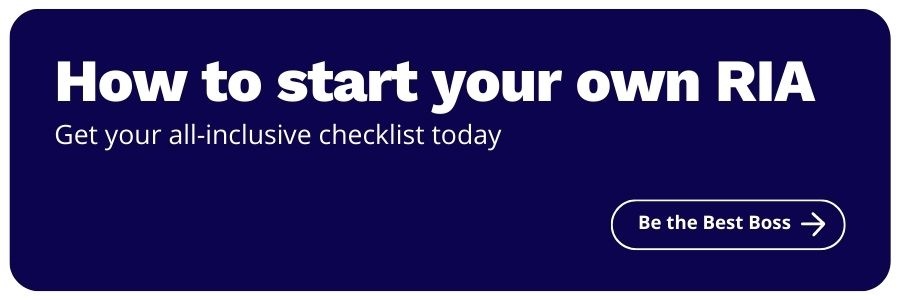Transition: Leaving Your Position with an Existing Firm to Start Your Own Fee-Only Firm
Share this
Leaving a position as an Investment Adviser Representative “IAR” for an existing firm can be a scary, yet rewarding, process. Being an IAR at an established firm tends to bring about a level of comfort grounded in the idea that as long as the advisory revenue continues to be generated, then consistent income will follow. As a Registered Representative of a Broker Dealer, oftentimes a rep may be paid a salary that is derived from pooled commissions and sales of insurance products, combined with advisory revenue and sales incentives. Alternatively, in a more traditional compensation structure, a Broker Dealer Rep may be compensated directly from commissions paid on the purchase and sale of securities.
Being an appointed agent with an insurance company, while offering less stability from an income perspective, can still be reassuring from a compensation standpoint. Reason being, stiff competition among insurance companies for sales of annuity and insurance products makes the job market full of sales opportunities across various companies. Still, these compensation methods are generally consistent, and therefore income from these revenue sources is fairly predictable.
Income consistency and job-security are major concerns for advisers leaving their existing position within the financial services industry to start their own firm. Here are a couple of key points to consider when contemplating this transition. (For more on this topic, check out our on-demand webinar, A New Path: Transitioning From the Broker/Dealer World.)
1. Your Existing Firm most likely does not benefit from your departure - As an IAR of an established firm, the firm’s revenue is often dependent upon the sales revenue generated from your advisory clients. Therefore, it is in the best interest of the firm, should you decide to terminate your employment with them, that they retain your clients. Therefore, many firms will have non-solicitation, or non-compete clauses in place, to prevent you from taking your clients with you when you leave. As a result, it is important to review any such agreements that you have executed with your existing firm, to ensure that your intentions are not in violation of these agreements. If you review an agreement and you are unsure, it is advisable that you seek legal counsel.
2. Your Existing Firm has a Compliance Program - When beginning the process of registering a new firm, it’s easy to place your existing firm’s compliance program on the backburner. This is never a good idea. Whether you are associated with a Broker Dealer, RIA, or Insurance Company, there are compliance implications to starting your own firm.
If you are a currently employed by a Broker Dealer or RIA, then your current employer will have a compliance department that is responsible for your supervision. That firm will have access to your profile via FINRA Firm Gateway, which is the same system that you will use to register your new firm. As you are in the process of registering your new firm, IN MOST CASES, your current firm will not be subject to notification until you file your Form U4. The Form U4 is the Uniform Application for Securities Industry Registration or Transfer. Representatives of broker-dealers, investment advisers, or issuers of securities must use this form to become registered in the appropriate jurisdictions.
When you file the U4 for your new firm, your existing firm will usually receive an alert, notifying them that you are starting your new firm. You may, at that point, be terminated.
However, some firms, as a part of their review of outside business activities, will search all of their representatives on the Secretary of State website to see if they are listed as officers, directors, managing members, or owners of any other business. This would usually occur during a branch audit, or an audit being conducted by regulators. If you have already listed your new firm with your State Secretary of State, then you are already exposed to the potential that your current employer may discover your intentions.
If you are appointed with an Insurance Company in order to sell annuity products for your Broker Dealer or RIA, then the above outlined potential for employer notification is the same. However, if you actually work for an Insurance Company in the capacity of an insurance salesman, and you are not an IAR or Registered Representative, then your exposure is significantly decreased by the fact that there may not be an existing U4 on file for you.
3. “It’s all About the Benjamins” - Figuring out how to maintain the ongoing stream of compensation and fee revenue is the most challenging part of the transition. As previously stated, your existing employer usually has no financial interest in helping you create a new revenue stream for your firm while decreasing the profitability of theirs. Therefore, it is imperative that the transitioning adviser create a feasible and coherent exit strategy before going out on their own. Here are some points:
Know your current Compensation Structure - Having a thorough understanding of how you are currently compensated is critical. If an adviser has a book of clients by which 65% of their compensation is revenue from commissions or insurance trails, then moving to a fee-only structure where this revenue source will be completely eliminated, requires some planning. Likewise, if an adviser is paid quarterly bonuses at their existing firm, and is in need of those funds to launch their own practice, then this factors into the timing involved in making the transition.
Do the Math - Run reports based on your current client revenue. Separate the revenue out into various categories for evaluation so that you have a clear picture of what the future could entail in your transition to fee-only.
Know your Clients - Particularly working within the BD structure, you will find that your current employer operates within many channels of the financial services industry. For instance, one of your clients at Wells Fargo Advisers may also have a Wells Fargo Mortgage, Credit Card, Checking Account, Savings Account and Car Loan. Anticipate the strong possibility that a client that is heavily invested in a large institution, utilizing them for multiple services, may not come with you when you start your firm. It’s almost certain that the Broker Dealer is going to make efforts to retain that client when you leave.
Also, don’t count on taking clients with you, if they were clients of the firm before you began working for the firm, unless you know them personally outside of your professional relationship. Those clients tend to exercise loyalty to the firm over the the individual adviser.
Evaluate your Personal Financial Situation - Before you make the transition, it’s important to do a household budget and make sure that you have enough in savings to sustain your lifestyle through this process.
4. Don’t try to Micromanage the Timeline of the Transition - The timeline for RIA Firm Registrations are unpredictable, particularly for state registered firms. Rarely, if ever, can anyone communicate with certainty, how long the process will take; so be financially and operationally prepared for at least a 4-week period between leaving your previous firm, and starting your new firm. Likewise, your existing firm has 30 days to file a Form U5 (termination) for you. In states that don’t allow dual registration, a compliance officer that is slow to terminate an IAR could create an additional unanticipated delay. So, in a nutshell, the adviser does not, and cannot, control the timeline of the transition.
In Conclusion, starting your own firm is extremely exciting. After working within the strict confines of existing rules and regulations, many which seem outdated and illogical, there is nothing more freeing than going into business for yourself. It can also be stressful, but by following the steps outlined here, you can begin the road to a smooth and successful transition.
 About the Author
About the Author
Scott Gill is the Director of Keeping Us Compliant here at XY Planning Network. Outside of the office, Scott enjoys watching sports, exercising, and operating the charitable organization he created upon his father’s passing.
Share this
- Advisor Posts (433)
- Fee-only advisor (388)
- Advice (316)
- Business Development (245)
- Independent Financial Advisor (204)
- Growing Your Firm (160)
- Marketing (132)
- Financial Planning (104)
- What Would Arlene Say (WWAS) (81)
- Firm Ownership (78)
- Business Coach (77)
- Training (76)
- Compliance (71)
- Business (69)
- Building Your Firm (68)
- Financial Advisors (65)
- Online Marketing (61)
- Events (60)
- Starting a Firm (50)
- From XYPN Members (48)
- Technology (48)
- Launching a firm (45)
- Advisors (42)
- Entrepreneurship (39)
- Taxes (39)
- Staffing & HR (38)
- Networking & Community (33)
- Interviews and Case Studies (32)
- Investment Management (32)
- XYPN Invest (28)
- Tax Preparation (27)
- Business Owner (25)
- Social Responsibility (25)
- Sales (24)
- Small Business Owner (20)
- Industry Trends & Insights (19)
- From XYPN Invest (18)
- Financial Planners (17)
- Independent Financial Planner (17)
- XYPN (17)
- Leadership & Vision (16)
- XYPN News (16)
- Tech Stack (15)
- How to be a Financial Advisor (14)
- RIA (14)
- Investing (13)
- Media (13)
- NextGen (13)
- Press Mentions (13)
- Financial Education (12)
- Goals (12)
- RIA Owner (12)
- XYPN Membership (12)
- Assets Under Management (AUM) (11)
- First Year (11)
- Niche (11)
- SEC (10)
- Advisor Success (9)
- RIA Registration (9)
- Communication (8)
- Lessons (8)
- Study Group (8)
- Time Management (8)
- Virtual Advisor (8)
- Growth (7)
- Mental Health (7)
- Pricing Models (7)
- From Our Advisors (6)
- Independent RIA (6)
- Money Management (6)
- Motivation (6)
- Preparing to Launch (6)
- Processes (6)
- Risk and Investing (6)
- Automation (5)
- Behavioral Finance (5)
- Broker-Dealers (5)
- College Planning (5)
- Filing Status (5)
- How I Did It series (5)
- Investment Planner (5)
- Michael Kitces (5)
- Preparing to Launch (5)
- Retirement (5)
- S Corpration (5)
- Scaling (5)
- Support System (5)
- TAMP (5)
- Wealth (5)
- Year-End (5)
- Bear Market (4)
- CFP Certification (4)
- Outsourcing (4)
- Selling a Firm (4)
- Small Business (4)
- State Registration (4)
- Succession Plans (4)
- Benchmarking Study (3)
- Bookkeeping (3)
- Budgeting (3)
- ESG Investing (3)
- Emotional Decisions (3)
- Engagement (3)
- Fiduciary (3)
- Financial Life Planning (3)
- Getting Leads (3)
- IRA (3)
- Life planning (3)
- Lifestyle practice (3)
- Membership (3)
- Millennials (3)
- Monthly Retainer Model (3)
- Monthly Subscription Model (3)
- Partnership (3)
- Pricing (3)
- RIA Audit (3)
- Recordkeeping (3)
- Risk Assessment (3)
- Staying Relevant (3)
- Wellness (3)
- Work Life Balance (3)
- Advice-Only Planning (2)
- Building Your Firm (2)
- Career Changers (2)
- Charitable Donations (2)
- Community Property (2)
- Design (2)
- Differentiation (2)
- Exchange-Traded Funds (ETF) (2)
- FINRA (2)
- Finding Your Why (2)
- Graphic design (2)
- Growing Income (2)
- Health Care (2)
- Inflation (2)
- Key performance indicator (KPI) (2)
- Keynote (2)
- Negative Rates (2)
- Operations (2)
- Organization (2)
- Outsourced Asset Management (2)
- Outsourced Bookkeeping (2)
- Portfolio Management (2)
- Productivity (2)
- Psychology (2)
- Quickbooks (2)
- Recommended Reading (2)
- Recruiting (2)
- Registered Representative (2)
- Registration (2)
- Restricted Stock Units (RSU) (2)
- Start Ups (2)
- Stock Options (2)
- Team Communication (2)
- Virtual Assistant (2)
- Virtual Paraplanner (2)
- Accounting (1)
- Arlene Moss (1)
- Assistant (1)
- Bonds (1)
- Bull Market (1)
- Careers (1)
- Certified Public Accountant (CPA) (1)
- Childcare (1)
- Client Acquisition (1)
- Client Services (1)
- Common Financial Mistakes (1)
- Consulting (1)
- Consumerism (1)
- Credit (1)
- Custodians (1)
- Custody Rule (1)
- Data (1)
- Daycare (1)
- Definitions (1)
- Designations (1)
- Direct Indexing (1)
- Disasters (1)
- Earn More (1)
- Family (1)
- Fidelity (1)
- Finance (1)
- Financial Freedom (1)
- Financial Goals (1)
- Financial Life Management (1)
- Financial Success (1)
- Financial Wellness (1)
- Form 8606 (1)
- Form 8915-E (1)
- Grief (1)
- Guide (1)
- How to Budget (1)
- Impostor Syndrome (1)
- Interns (1)
- Investor Policy Statement (IPS) (1)
- Job burnout (1)
- Liquidating your business (1)
- Loans (1)
- Moving Forward (1)
- Part Time (1)
- Paying Yourself (1)
- Paystub (1)
- Perfectionism (1)
- Project Management (1)
- Projecting Returns (1)
- Purpose (1)
- Quarterly Estimated Payments (1)
- RIA Operations (1)
- Recession (1)
- Referrals (1)
- Regulations (1)
- Regulators (1)
- Reinvention (1)
- Relationships (1)
- Remote (1)
- Required Minimum Distributions (RMD) (1)
- Risk Management (1)
- Roth Conversations (1)
- Roth IRA (1)
- Sabbatical (1)
- Spending (1)
- Strategy (1)
- Systems (1)
- Target Audience (1)
- Teamwork (1)
- Terms (1)
- To-Do List (1)
- Traditional IRA (1)
- Transitions (1)
- Virtual (1)
- Vulnerability (1)
- XYPN Books (1)
Subscribe by email
You May Also Like
These Related Stories

4 Tips for Customizing Your Firm’s Compliance Manual

Three Compliance Goals You Should Set for Your Financial Planning Firm





